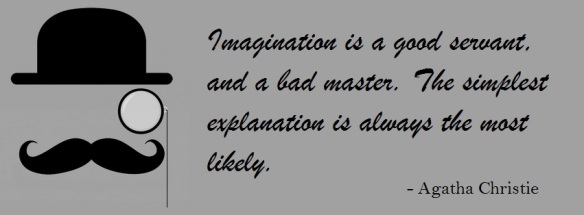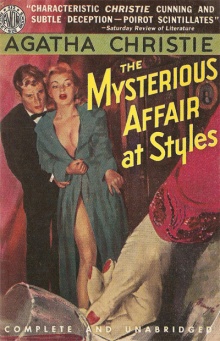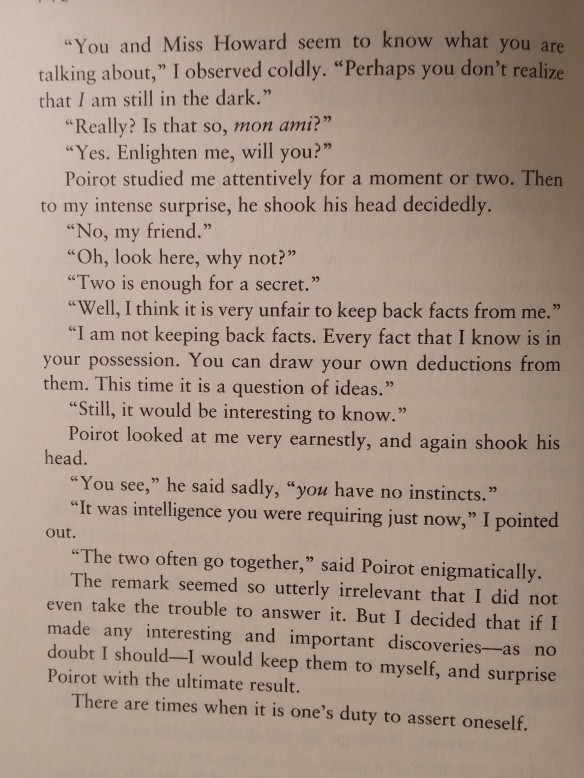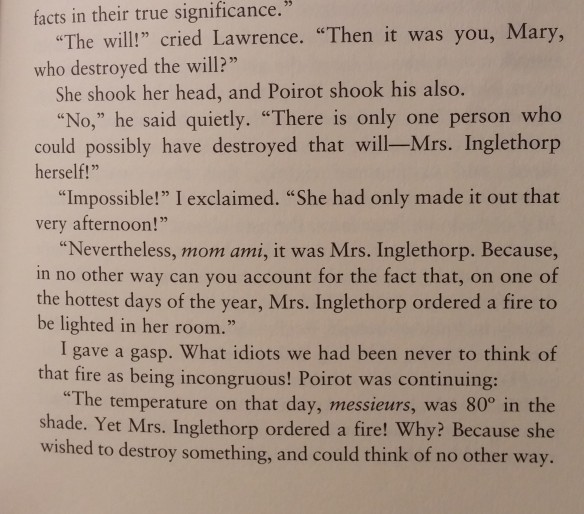 I admit that I still confuse “unlikeable” with “unreliable” every now and again. An “unlikeable” narrator is not so much a twit as an asshole. One we just can’t bring ourselves to care about. If the story swallows him up, good riddance. If he gets away with it, then we enjoy imagining how he’ll get his comeuppance in the unwritten pages thereafter.
I admit that I still confuse “unlikeable” with “unreliable” every now and again. An “unlikeable” narrator is not so much a twit as an asshole. One we just can’t bring ourselves to care about. If the story swallows him up, good riddance. If he gets away with it, then we enjoy imagining how he’ll get his comeuppance in the unwritten pages thereafter.
Captain Hastings is NOT unlikeable. In fact, he’s one of the kindest, loveliest chaps you could ever hope to meet on the page. Affable, thoughtful, and never afraid when things get dicey, he’s the bloke we’d never mind having over for a long visit. Hugh Fraser was a brilliant casting choice for Hastings in the Mystery! presentations of Poirot that ran for decades, what with his bright eyes and sweet smile. In fact, he’s so sweet that we, the audience, can’t bear to smack him with a rolled-up newspaper until the latter half of the Mysterious Affair at Styles, when we all KNOW he should know better.
 Agatha Christie’s creation of Hastings is, as I said in the previous post, not necessarily meant to be a Watson clone. While both were army veterans, Hastings has no medical experience, so when it comes to forensic studies of the body, he’s very much an every man. Perhaps that’s why Christie enjoyed using him in so many of the Poirot mysteries, and why television adaptations worked Hastings into stories where he hadn’t been written in: he’s the Every Man. Hastings is Us.
Agatha Christie’s creation of Hastings is, as I said in the previous post, not necessarily meant to be a Watson clone. While both were army veterans, Hastings has no medical experience, so when it comes to forensic studies of the body, he’s very much an every man. Perhaps that’s why Christie enjoyed using him in so many of the Poirot mysteries, and why television adaptations worked Hastings into stories where he hadn’t been written in: he’s the Every Man. Hastings is Us.
And we are sooooo clueless around someone like Poirot. Yet in Styles Hastings time and again wants to prove himself Poirot’s superior in the world of detection. Near the beginning of the investigation, Hastings already questions Poirot’s abilities:
I shrugged my shoulders. If he was going to take the matter that way, it was no good arguing with him. The idea crossed my mind, not for the first time, that poor old Poirot was growing old. Privately I thought it lucky that he had associated with him some one of a more receptive type of mind.
Every member of the family is certain that the odd duck Alfred Inglethorp is guilty BECAUSE he’s the odd duck: married the old lady for her money, etc. He acts suspicious, he dresses suspicious, so therefore, guilty. After Mrs. Inglethorp’s death–during which Alfred is suspiciously absent–the whole family sees nothing but clues proving their case. Although he recruits Poirot to discreetly investigate, Hastings completely agrees with the others, and cannot understand at all why Poirot would disagree with them both before and after Alfred Inglethorp’s vindication:
-
As for me, I was literally dumb with astonishment. I could only conclude that Poirot was mad.
-
His words gave me an unpleasant shock…Still, I had a great respect for Poirot’s sagacity—except on the occasions when he was what I described to myself as “foolishly pigheaded.”
-
This proceeding of Poirot’s, in respect of the coco, puzzled me intensely. I could see neither rhyme nor reason in it. However, my confidence in him, which at one time had rather waned, was fully restored since his belief in Alfred Inglethorp’s innocence had been so triumphantly vindicated.
How does Christie pull this off? On the one hand, she has to make sure all the clues to the murder are set into the lines of text, but she can’t be obvious about it. How can she get these major points by the casual reader? By placing them before a casual observer. For while Hastings may see himself as a thoroughly intelligent fellow who’s built upon Poirot’s method, in reality he is one who has allowed himself to be led to conclusions by others–not just the family, or the murderer. By Poirot, too.
“Who put it in the chest, I wonder?”
“Some one with a good deal of intelligence,” remarked Poirot drily. “You realize that he chose the one place in the house to hide it where its presence would not be remarked? Yes, he is intelligent. But we must be more intelligent. We must be so intelligent that he does not suspect us of being intelligent at all.”
I acquiesced.
“There, mon ami, you will be of great assistance to me.”
I was pleased with the compliment. There had been times when I hardly thought that Poirot appreciated me at my true worth.
“Yes,” he continued, staring at me thoughtfully, “you will be invaluable.”
This part still makes me chuckle. We the readers know that Hastings is indeed being complimented on his true worth–only it’s not quite the same worth Hastings thinks he’s earned. I see this as Christie’s signal to readers that Poirot is NOT going to be giving Hasting’s clear clues from here on out. What we observe through Hastings’ senses may or may not be completely true. We’ll have to mind his perception that it doesn’t veil the truth from ours.
This slight shift in their budding partnership does lead to conflict between the two, which is another reason why I enjoy these characters so much. True people react to how they’re treated. At one point Hastings knows Poirot’s keeping stuff from him, and calls him out. Here a friendship is tested over truth:

Some characters can listen, absorb, and grow. Others, like Hastings, are, shall we say, “stubborn.” Even after one of his friends is arrested for the murder, Hastings doesn’t understand why Poirot wasn’t more open.
“Every murderer is probably somebody’s old friend,” observed Poirot philosophically. “You cannot mix up sentiment and reason.”
“I must say I think you might have given me a hint.”
“Perhaps, mon ami, I did not do so, just because he was your old friend.”
I was rather disconcerted by this…
Last I checked, “disconcerted” is NOT the same as “understanding.” Hastings has once again been told something very true but also unpleasant about his perspective on things, and once again he can’t quite take it in. As readers, we’re not totally sure what to make of it all, either. By now we’re on Possible Murderer #3…or is it #4…dammit EVERY one is a suspect! By now Christie’s slathered suspicion all over every member of the Inglethorp family. How can we readers possibly see through all this muck?
We won’t. And yet it is the Every Man’s observation that saves the day, for it is Hastings that reminds Poirot of a simple action from early in the investigation that sets Poirot’s grey cells dancing and reveals all to Poirot. Only after Poirot gathers all the suspects into one room (love that part!) and walks through the case step by step do the other characters–Hastings included–come to realize their own blindness to the facts:

With the killer(s) revealed and brought to justice, the mystery can end, yes? Not quite. While we may not feel too invested in the family of suspects, we have been with Hastings and Poirot for quite a while now. It’d be a strange move to have these two end the book in a tiff. There’s a reconciliation to be done, and it’s done in such a way that we chuckle yet again over Poirot’s unique way of “handling” Hastings, although we know his compliments to be also genuine:
“Poirot, you old villain,” I said, “I’ve half a mind to strangle you! What do you mean by deceiving me as you have done?” …
“I did not deceive you, mon ami. At most, I permitted you to deceive yourself.”
“Yes, but why?”
“Well, it is difficult to explain. You see, my friend, you have a nature so honest, and a countenance so transparent, that—enfin, to conceal your feelings is impossible! If I had told you my ideas, the very first time you saw Mr. Alfred Inglethorp that astute gentleman would have—in your own expressive idiom—‘smelt a rat’! And then, bon jour to our chances of catching him!”
“I think that I have more diplomacy than yon [sic] give me credit for.”
“My friend,” besought Poirot,” I implore you, do not enrage yourself! Your help has been of the most invaluable. It is but the extremely beautiful nature that you have, which made me pause.”
“Well,” I grumbled, a little mollified. “I still think you might have given me a hint.”
Just because a character has a beautiful nature doesn’t mean he’s completely reliable. When a writer needs to reveal all and yet hide some, an unreliable narrator allows for truth-in-truth, a slight of hand that does not insult, but perpetuates the curiosity which meets us on page 1 and moves with us still. We must trust this narrator completely with the facts, and yet not so completely so as to give away all the plot points before their time. A careful balance requires a careful hand. God-willing, I’ll have that hand someday.
Perhaps your day’s already come.
Click here for more on Agatha Christie & Hercule Poirot.

Nice post my darling but then your posts always are xxxx
LikeLiked by 1 person
I bow to your grace and loveliness and say, why thank you, I adore your writing as well, and please send my regards to Hamstah Dickens, your grace your grace and wow I’m in a goofy rut today…maybe don’t say that last part to the hamsters… xxxx
LikeLiked by 1 person
Love the way you really take the writing to bits and find the clever points to make. I won’t tell the dudes. They are busy moaning anyway. xx
LikeLiked by 1 person
Thanks! I’m a bit daunted by tackling the plot angle next–I really want to work out clue-dropping and such in ABC MURDERS, which is one of my favorites, but it’s been 20 years since I’ve read it, so I have a feeling this read-through will be very, very slow-going…
When are the dudes NOT busy moaning?
S**t, don’t tell them I said that! 😛 xxxx
LikeLiked by 1 person
My lips re sealed x
LikeLiked by 1 person
Oddly perhaps, the TV adaptions of Christie’s work insofar as Hastings is concerned never really worked for me. The chap is too nice; too vulnerable…almost had me wanting to strangle him! The stooge is essential to the template (that old analogy again) in early murderer/mystery genre only to assist in displaying the panache of the lead role with an analytical brain. Then again, I am often wrong! I once let Watson take the prime roll in a few skits when Holmes had ‘detective’s block’ and it wasn’t until I started writing them that it dawned on me that he was so very ripe for satire. Whatever, and as ever Ms Jean Lee you have sparked this old brain of mine into thinking mode again. A fine, fine read.
LikeLiked by 1 person
He IS too nice! As I read this I was remembering the two different Watson actors who worked with Jeremy Brett on those TV adaptations. The first…Hart, yes?…Well the first drove me bonkers. Too nice, too “old chap” about EVERYthing. You looked at his face, and you couldn’t imagine a single cog moving behind it. Edward Hardwicke, the second Watson, at least had a presence of mind about him. When he makes his own suppositions in EMPTY HOUSE, you don’t dismiss him outright because he has a good air of authority. He has multiple cogs moving. Sure he’s usually wrong, but at least he’s trying based on knowledge you believe he has.
This actually made me wonder why on earth Hastings and Poirot stick together for as long as they do, and I can’t help but wonder if it’s in Poirot’s note a the end of the story: Hasting’s “beautiful nature.” We’re all in need of a companion, a good heart. Not all hearts are up for the level of eccentricity we or any detective thrusts upon the world. And these good hearts not only accept us for all that we are–they inspire us to be even more, to reach the summit, and see, a stair into the stars. These detectives had good hearts in their companions, hearts they knew would see them through when the rest of the world made no sense. Their good hearts were the one constant from problem to problem, case to case. When the world was chaotic or stagnant, those good hearts beat on.
And isn’t that what any of us would want in a companion, regardless of the presence or absence of cogs? 🙂
LikeLiked by 2 people
‘When the world was chaotic or stagnant, those good hearts beat on’ what a fabulous line…more so in that I had to go back and read again your reply…brilliant. The Bridge written by Hans Rosenfeldt, turned into a TV (Scandinavian, in subtitles, better than English copies) is one of the few TV adaptations where TV matches book in quality. With this, plus spin offs, the two lead characters are of similar intellect, yet one (the female copper) is an autistic, literal thinker proving that equals (in terms of cleverness) can work within the TV genre, although perhaps would not have back in the day. Poirot and Hastings remind me of Top Cat and Benny the Ball when on screen…books are always best I think. What are your three favourite books…your academic, analytical dissection has got me curious…you ought to be a national newspaper/journal highly paid critic!
LikeLike
I will always wonder who was her prototype for Hastings?
LikeLiked by 1 person
Now I am, too! Bo and I were watching an online video about the REAL inspiration of Sherlock Holmes. “Well duh, everyone knows that,” I said before the video started. “Dr. Joseph Bell, Doyle’s mentor.” Oh NOOOO I’m all wrong, it was this French spy person whose name I’ve totally forgotten. But apparently some of his methods were since adopted by Scotland Yard, and I HAVE a book about Scotland Yard somewhere, so I really need to look that up…
But no, I wish I knew who inspired Hastings. Honestly, I wouldn’t be surprised if he was a mix of a relative who always acted like he knew a bit more than he really did, and maybe just a touch of Watson as a sort of thumb-bite to Doyle.
…no, that sounds rather below her. Well stink, I don’t know! Now I’ll be pondering this for a while…
LikeLiked by 1 person
Oh dear, now look what I started! 🙂
LikeLiked by 1 person
Honestly, when I’m done grading, I WILL do some hardcore research. (aka, type some words on the screen and make Google throw millions of hits at my face 🙂
LikeLiked by 1 person
This was charming to read. You bring back fond memories. Unreliable versus unlikeable,I’ll have to remember that. 🙂
LikeLiked by 1 person
Thank you kindly! Ever since reading Martin Amis’ THE RACHEL PAPERS, I know what an unlikeable narrator can do to readers; my fiction class was at odds for hours over him and whether his presence in the book made it burnable or awesome…able. You get my point. 🙂
LikeLiked by 1 person
Fine posts, nice blog … Congratulations
Welcome to see my creations:
http://paintdigi.wordpress.com
LikeLike
I’m embarrassed to admit I’m utterly Agatha Christie-ignorant, but I read this post and marveled at your facility with language and your perspective. You’re a magnificent writer, and it doesn’t matter what you’re writing about. You write with depth within those sentences and with finesse, and of course humor – all of the qualities are proof of a writer who has what it takes to produce fine, unique work that affects the reader long after the book cover has been closed or the Kindle shut off.
LikeLiked by 2 people
You reeeeeeally want me to edit your book.:)
Seriousy, though, I thank you, my Tea Companion! One of these days, I’ll actually write a story, and we’ll see how you dig it… 😉 xxxx
LikeLiked by 1 person
p.s. apologies for the run-on sentences but I just had iced coffee!!! Of course it’s all the coffee’s fault
LikeLiked by 1 person
Well duh, coffee! 🙂
LikeLiked by 1 person
Reblogged this on The Mysterious & Mischievous Scott McGowan.
LikeLiked by 1 person
Thank you so much for sharing my work!
LikeLiked by 1 person
Enjoyed your post and the analysis. I guess that most of us cannot keep secrets well 🙂 I would probably stare at the murderer, or try not to stare. As the wise man said – two is enough for a secret 🙂
LikeLiked by 1 person
Indeed! I would be so out-of-my-way nice to the murderer so as NOT to make it obvious that I would most certainly make it worse. 😛
LikeLiked by 1 person
I so love these books! They are perfect.
LikeLiked by 1 person
I came to your blog to thank you for visiting my blog. After reading yours I decided that I needed to follow you because your writing was very intuitive and I enjoyed it so much. When I read authors like Sir Arthur Conan Doyle and Agatha Christie I love the language. I sense that you also are enthralled by the vocabulary and writing skills of such excellent writers. So we are akin. I enjoyed the passages you chose immensely.
LikeLiked by 1 person
Thank you so much for the compliment! I’m hoping to study Christie a bit more, actually, as I’ve always loved reading mysteries, but am still as naive as anyone as to how they work. Doyle, PD James, Ellis Peters, Colin Dexter, Elizabeth George…yeah, I’m a sucker for a good British cozy. 🙂
LikeLiked by 1 person
Maybe I’m just not susceptible to a mustache, but I wouldn’t want Poirot calling me mon ami.
LikeLiked by 1 person
I’m not sure if it’s the mustache so much as the shoes that do it. 😉
LikeLike
She is one of my favourite author
LikeLiked by 1 person
Mine, too. 🙂 Thanks so much for reading!
LikeLiked by 1 person
Pingback: Lessons Learned from Agatha Christie: Pack it on Every Page. – Jean Lee's World
Pingback: Lessons Learned from Agatha Christie: Even a B Novel Should Have an A Title. | Jean Lee's World
The beauty with Christie is that the stories are quite simple and yet time and time again I pick the wrong villain, but as soon as I find out I kick myself because the clues were so obvious. I do like a book with a flawed narrator, adds colour.
LikeLiked by 1 person
Ha! I do that, too. It’s annoying when she holds clues off until the Last Reveal, when Poirot says something he found out that we never could have known, but at least Christie doesn’t do that all the time.
LikeLiked by 1 person
It’s a shame they can’t some how reboot the books again so the younger generation can enjoy them too.
LikeLiked by 1 person
Oh, I dunno. Those modern Sherlock Holmes show modern reboots can be really hit or miss. And there was that new Kenneth Branaugh Murder on the Orient Express. Did you see it?
LikeLiked by 1 person
No I was thinking about the books somehow. Maybe an anime graphic novel – no ignore me that’s just stupid.
LikeLiked by 1 person
Oh! well I love the stories, and even a few non-canon tales, too. There’s a few where Sherlock’s in America, one where he faces the Phantom of the Opera, one starring the Baker Street Irregulars…there’s some neat ones!
LikeLiked by 1 person
Pingback: #writerproblems: #writing awesome #characterdesign in three sentences or less. | Jean Lee's World
Pingback: #lessonslearned from #AgathaChristie: one #narrative #pov does not fit all #stories. | Jean Lee's World